Unit 12 What did you do last weekend单元复习课件(词组+句型+知识点+语法+写作指导+易错考点)
文档属性
| 名称 | Unit 12 What did you do last weekend单元复习课件(词组+句型+知识点+语法+写作指导+易错考点) |

|
|
| 格式 | pptx | ||
| 文件大小 | 92.5MB | ||
| 资源类型 | 试卷 | ||
| 版本资源 | 人教新目标(Go for it)版 | ||
| 科目 | 英语 | ||
| 更新时间 | 2024-05-27 00:00:00 | ||
图片预览

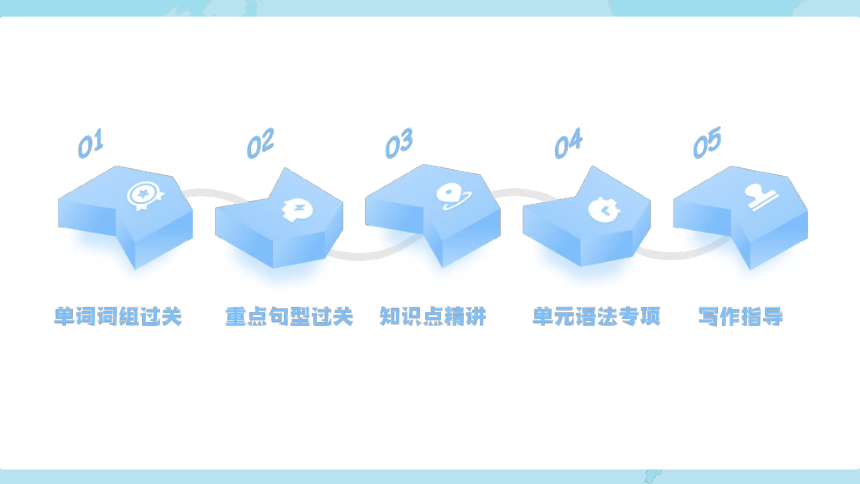

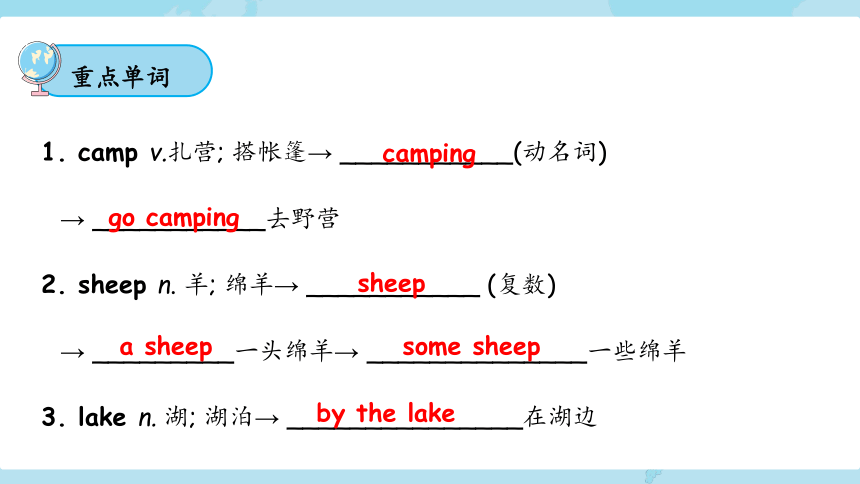
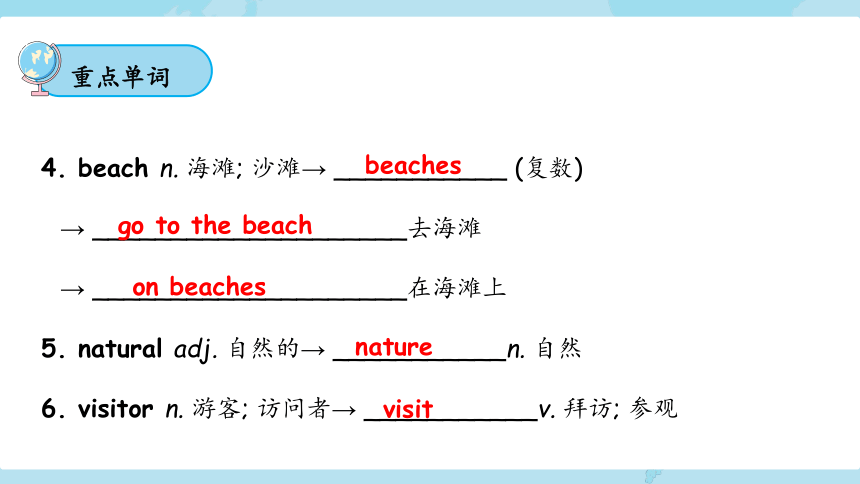
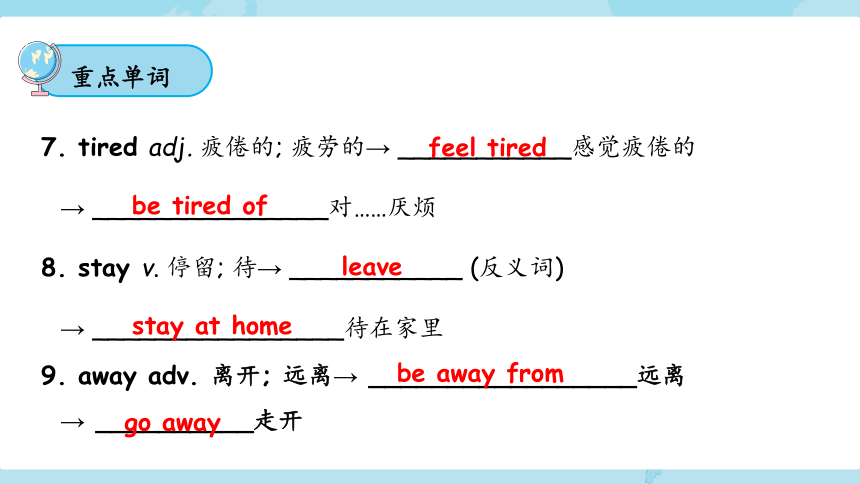
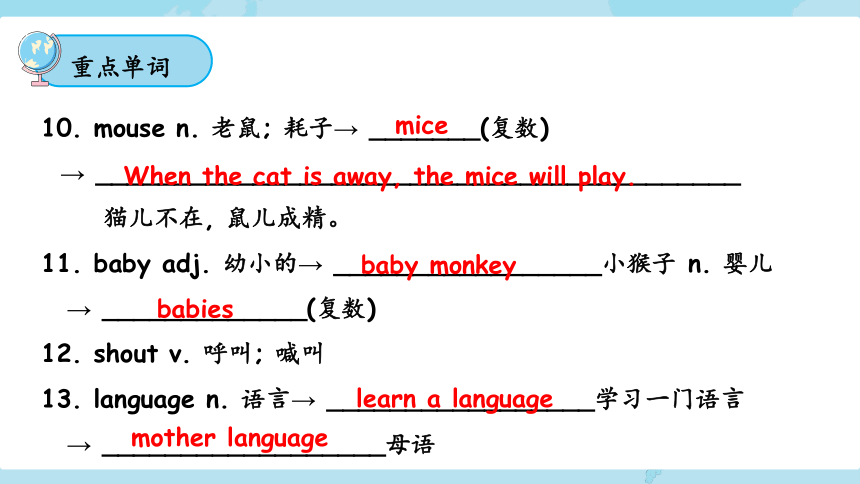
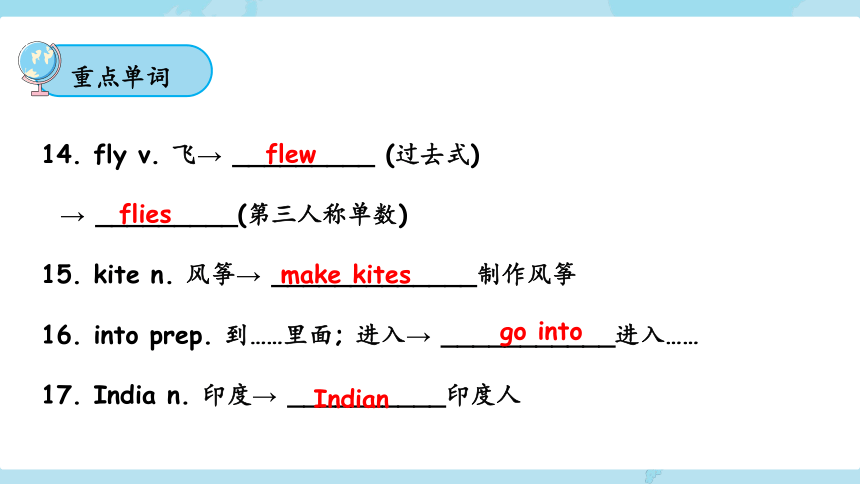


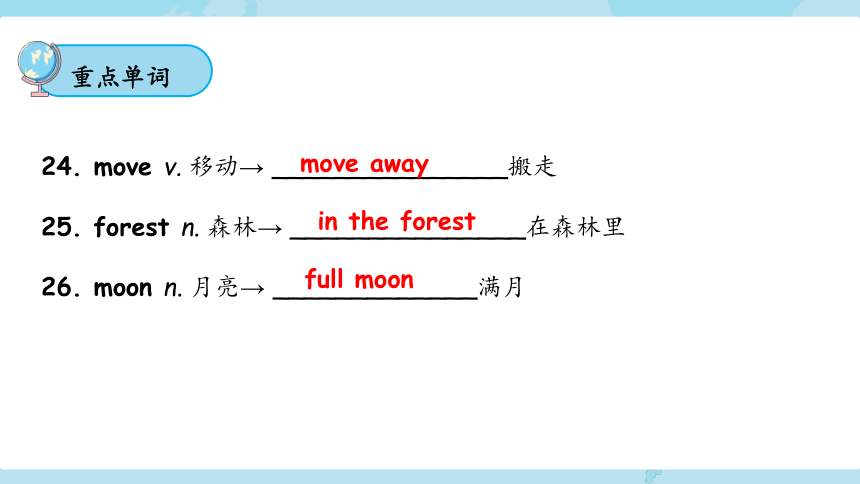
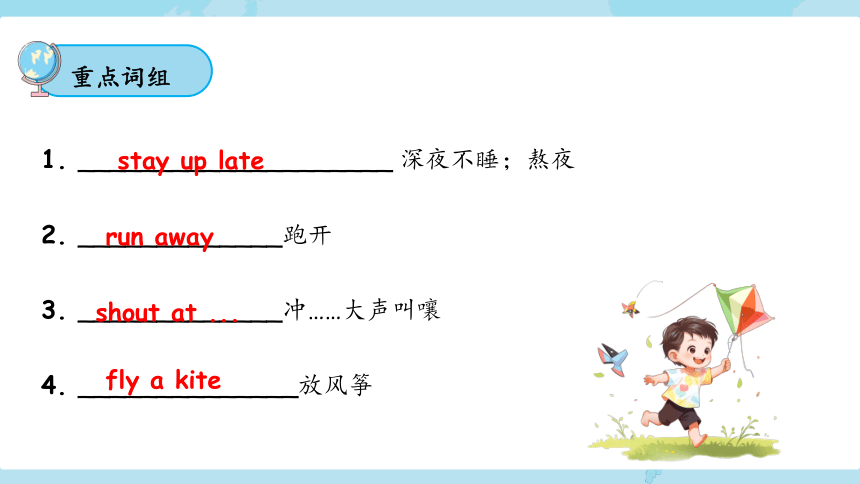
文档简介
(共170张PPT)
重点单词
1. camp v.扎营; 搭帐篷→ ___________(动名词)
→ ___________去野营
2. sheep n. 羊; 绵羊→ ___________ (复数)
→ _________一头绵羊→ ______________一些绵羊
3. lake n. 湖; 湖泊→ _______________在湖边
camping
go camping
sheep
a sheep some sheep
by the lake
重点单词
4. beach n. 海滩; 沙滩→ ___________ (复数)
→ ____________________去海滩
→ ____________________在海滩上
5. natural adj. 自然的→ ___________n. 自然
6. visitor n. 游客; 访问者→ ___________v. 拜访; 参观
beaches
go to the beach
on beaches
nature
visit
重点单词
7. tired adj. 疲倦的; 疲劳的→ ___________感觉疲倦的
→ _______________对……厌烦
8. stay v. 停留; 待→ ___________ (反义词)
→ ________________待在家里
9. away adv. 离开; 远离→ _________________远离
→ __________走开
feel tired
be tired of
leave
stay at home
be away from
go away
重点单词
10. mouse n. 老鼠; 耗子→ _______(复数)
→ _________________________________________
猫儿不在, 鼠儿成精。
11. baby adj. 幼小的→ _________________小猴子 n. 婴儿
→ _____________(复数)
12. shout v. 呼叫; 喊叫
13. language n. 语言→ _________________学习一门语言
→ __________________母语
mice
When the cat is away, the mice will play.
baby monkey
babies
learn a language
mother language
重点单词
14. fly v. 飞→ _________ (过去式)
→ _________(第三人称单数)
15. kite n. 风筝→ _____________制作风筝
16. into prep. 到……里面; 进入→ ___________进入……
17. India n. 印度→ __________印度人
flew
flies
make kites
go into
Indian
重点单词
18. surprise n. 惊奇; 惊讶 v. 使吃惊
→ _________________令某人惊奇的是
→ __________adj. 令人惊奇的
→ __________adj. 惊奇的
→ ___________________________做某事感到吃惊
19. start v. 开始; 着手→ __________(同义词)
→ _______________________________开始做某事
to one’s surprise
surprising
surprised
be surprised to do sth.
begin
start to do sth./start doing sth.
重点单词
20. jump v. 跳; 跃→ ______________________跳上跳下
21. wake v. 弄醒; 醒→ __________ (现在分词)
→ __________ (过去式) → __________ (adj.) 醒着的
22. high adj. & adv. 高的(地) → __________n. 身高; 高度
→ _________________飞得非常高
23. ago adv. 以前→ _______________很久以前
→ __________ (近义词)
jump up and down
waking
woke awake
height
fly very high
long time ago
before
重点单词
24. move v. 移动→ _______________搬走
25. forest n. 森林→ _______________在森林里
26. moon n. 月亮→ _____________满月
move away
in the forest
full moon
重点词组
1. ____________________ 深夜不睡;熬夜
2. _____________跑开
3. _____________冲……大声叫嚷
4. ______________放风筝
stay up late
run away
shout at ...
fly a kite
重点词组
5. _________________搭起; 举起
6. _________________上上下下; 起伏
7. _________________把……弄醒
8. _________________中学
put up
up and down
wake ... up
high school
重点词组
16. _________________吃惊
17. _________________互相; 彼此
18. _________________对……大声喊叫
shout to ...
get a surprise
each other
重点句型
1. —________ ________ ________ ________ last weekend, Lucy 上周末你干什么了, 露西
—Well, on Saturday morning, _______ _________ _____________.
噢, 周六上午我打羽毛球了。
What did you do
I played
badminton
重点句型
2. —________ ________ her grandma
谁看望了她的奶奶
—________ ________.
贝姬(看望了她的奶奶)。
3. I ________ ________ ________ ________ ________ the soccer game.
我熬夜看足球比赛了。
Who visited
Becky did
stayed up late to watch
重点句型
4. ..., ________ ________ ________ _____________ ________ ________ a second language.……
...这就是为什么多学一门语言重要啦...
5. —What did you do last weekend 上周末你(们) 干了什么
—I did my homework./We went boating.
我做我的家庭作业了。/ 我们去划船了。
that’s why it’s important
to learn
重点句型
6. But I was ________ tired ________ I went to sleep early.
但是我太累了, 所以早早就睡着了。
7. He also told me ________ ________ ______________ ______ ______ ______ ________ ________ ________.
他还告诉我重要的是不要靠近蛇。
so that
it was important
not to go near a snake
重点句型
8._________ an interesting job they have!
他们有一个多么有趣的工作啊!
What
知识点1:camp/k mp/v. 扎营; 搭帐篷
e.g. Last night, they camped in the forest.
昨晚他们在森林里扎营。
What a sunny day! Why not go camping with your friends
多晴朗的一天啊!为什么不和你的朋友们去野营呢?
camp 作动词时的常见搭配:
go camping 去野营
camp out 露宿;借宿
知识点1:camp/k mp/v. 扎营; 搭帐篷
拓展: camp 用 作名词, 意为“营地; 度假营”。
e. g. Let’s go back to the camp. It’s getting dark.
让我们回营地吧。天黑下来了。
Did you go to the summer camp last year
去年你参加夏令营了吗
camp 作名词时的常见搭配:
① summer camp 夏令营
② winter camp 冬令营
典型例题
这个周末我们去野营吧。
Let’s _________ __________ this weekend.
go camping
知识点2:last weekend 上周末
考向:“last + 表示时间的词(如night, weekend, month, year,
Sunday, week 等)”构成表示过去的时间状语,其前通常不用at, on, in 等介词。
e.g. He went to the beach last Sunday.
上周日他去海滩了。
weekend 的常见搭配:
last weekend 上周末
this weekend 本周末
next weekend 下周末
知识点3:sheep/ i p/ n. 羊; 绵羊
考向:sheep是可数名词,单复同形。
e.g. I raised a sheep last year.
去年我养了一只羊。
How many sheep are there on the farm
在农场有多少只绵羊
sheep 的常见搭配:
black sheep 害群之马
sheep farmer 牧羊人
sheep wool 羊毛
a wolf in sheep's clothing
披着羊皮的狼
典型例题
Look! There are some __________(绵羊)on the hill.
sheep
【点拨】sheep“绵羊”,some 修饰可数名词复数,sheep单复数同形。
知识点4:did 的用法
Becky did.
考向:本句是一个省略句,用did 代替了上句中的行为动作,完整回答应是“Becky visited her grandma.”。该结构是为了避免与上句中的行为动作重复。
e.g. My sister didn’t go camping, but my brother did.
我姐姐没去野营,但是我哥哥去了。
代替went camping
知识点4:did 的用法
拓展:也可用so 代替上句中的相关内容。
e.g. —Do you think this new subject is useful
你认为这门新学科有用吗
—I think so. 我认为如此。
so 代替this new subject is useful
典型例题
—Who got to the station on time
—I _______! In fact, I arrived there 5 minutes earlier.
A. was B. got
C. did D. do
知识点5:work as 从事……工作
e.g. Her son is working as a math teacher.
她的儿子是一位数学老师。
My uncle works for an engineering company.
我叔叔在为一家工程公司工作。
as 后接职业名词
知识点5:work as 从事……工作
e.g. Her son is working as a math teacher.
她的儿子是一位数学老师。
My uncle works for an engineering company.
我叔叔在为一家工程公司工作。
work 的相关短语:
① work for 为……工作
② work on 从事;忙于
③ work sth. out 算出;解决某事
知识点5:work as 从事……工作
e.g. The famous actor is working on his new movie.
这位著名的演员正在忙于他的新电影。
The math problem is some difficult. Can you work it out
这道数学题有点难。你能算出来吗?
典型例题
I can’t visit the animals today. I’ll _______ a volunteer in the
park.
A. work out B. work as
C. look after D. look up
【点拨】work out 算出;解出。work as 担任;当。look after 照顾;照料。look up 查找。根据句意可知,“我”将在公园做志愿者。
知识点6:as / z , z/ prep. 作为;当作
e.g. Treat me as a friend. 把我当作朋友。
You can use the glass as a vase. 你可以把这个玻璃杯当作花瓶用。
As a student, I must study hard.
作为一名学生,我必须努力学习。
易错点:
as 用作介词,后接表示职业、用途等的名词。含有as 的短语放在句首时,要与后面的内容用逗号隔开。
辨析: as 与like
as 以实际的身份或地位。
He spoke as a teacher. 他作为一名老师发言。
It’s great to have a big bird as a guard!
能有一只大鸟当守卫真是太好了!
like 与……相似; 以与……相类似的方式。
He spoke like a teacher. 他讲话像个老师。
as 用作介词,后接表示职业、用途等的名词。含有as 的短语放在句首时,要与后面的内容用逗号隔开。
典型例题
_______ students, we’re supposed to go to the museum often.
We can get knowledge from the things on show.
A. As B. By C. About D. Like
【点拨】用语境判定法。As作为,当作;By 被,通过;About 关于;Like 像。由“我们能从展品中获得知识”可知前面是“作为学生”。
知识点7:感叹句
知识点7:感叹句
e.g. How beautiful the picture is! 这张照片多漂亮啊!
How fast he runs! 他跑得多快啊!
What an exciting movie it was! 多令人激动的一部电影啊!
What beautiful flowers they are! 多美的花朵啊!
What a heavy rain it is! 多大的雨啊!
易错点:
引导感叹句时,how 强调的是形容词或副词;what强调的中心词是名词。
知识点7:感叹句
拓展:感叹句中,在主语后面如果使用all 或both,二者必须放在be 动词的前面。
e.g. How smart the girls all are!
这些女孩多聪明啊!
口诀记忆感叹句:
感叹句,表情感,
how 和what 放句前;
名词短语用what,
how 后形副紧相连。
典型例题
—Look at Panda YaYa _____! happy she is!
—Yes. There is enough fresh bamboo for her to eat now.
A. What B. What a C. How a D.How
【点拨】句意:—— 看熊猫丫丫!她是多么幸福啊!——是的。现在有足够的新鲜竹子供她吃。考查感叹句。本句强调的中心词是形容词happy,用“How+adj.+主谓!”句型。
典型例题
_______ good day! Why not take a walk along the sea
A. What B. What a
C. How D. How a
【点拨】考查感叹句。中心词day 是可数名词的单数形式,用what 引导的感叹句“What+a/an+ 形容词+ 可数名词的单数形式+ 主谓!”。
知识点8:living habits 生活习惯
考向: living 是动词live 的-ing 形式,作定语修饰habits。
e. g. You have to think of your living habits.
你不得不考虑一下你的生活习惯。
类似表达:eating habits 饮食习惯
swimming pool 游泳池
waiting room 等候室
拓展: living 的其他用法
用法 示例
形容词, 意为“活着的”, all living things 所有生物。 Is the fish still living 鱼还活着吗
They didn’t find any living things on the moon. 他们在月球上没有发现任何生物。
名词, “生计; 谋生; 生活方式”, make a living 谋生。 He made a living by writing.
他靠写作谋生。
知识点9:tired/ta (r) d/ adj. 疲倦的
e.g. If you are tired, you’d better stop to have a rest.
如果你累了, 你最好停下来休息一下。
I’m tired of the boring show.
我对这无聊的演出感到厌烦。
be tired of... 对……感到厌烦
辨析:tired 与tiring
tired “疲倦的;厌烦的”,用来描述人。表示人的主观感受。
tiring “令人困倦的”,用来描述事或物。表示事物本身让人疲劳。
一语辨异:
We are tired of doing the tiring work.
我们厌烦做这些令人感到劳累的工作。
典型例题
It was a ______ day and she felt very ______.
A. tiring; tired B. tiring; tiring
C. tired; tiring D. tired; tired
知识点10:stay up late 深夜不睡;熬夜
e.g. Don’t stay up late to finish the design, or you may be tired out.
不要熬夜完成设计,否则你可能会筋疲力尽。
Don’t stay up all night studying. Even the exam is coming.
不要整晚熬夜学习,即使考试即将到来。
= stay up
stay up all night 整夜不睡觉
典型例题
学生不应该熬夜,因为他们需要充足的睡眠。(完成译句)
Students should not _________ _________ because they
need enough sleep.
【点拨】用语法分析法。stay up 意为“熬夜”;should 是情态动词,后跟动词原形。
stay up
知识点11:stay /ste / v. 停留;待
考向:stay 常与表示场所的副词(短语)连用。若与地点名词连用,则stay后加介词。
与stay 相关的短语:
① stay in 待在室内 ② stay away from 远离
③ stay out 待在户外 ④ stay at home 待在家里
e.g. Don’t stay there for too long. 别在那里耽搁太久。
It’s raining outside, so we have to stay at home.
外面正在下雨,因此我们不得不待在家里。
拓展:
(1) stay 作连系动词, 意为“继续是; 保持”, 其后常接形容词作表语。
e. g. The weather will stay fine for several days.
天气将持续晴朗几天。
(2) stay 作名词, 意为“停留; 逗留(时间) ”。
e. g. During my stay in Beijing, I had a good time.
在北京逗留期间,我玩得很高兴。
典型例题
As a student, you must s away from smoking and drinking.
【点拨】stay away from 表示“远离……”;情态动词must 后应该用动词原形。
tay
知识点12:run away 逃走;跑开
考向:其中away 是副词,意为“离开,远离”,常与run, go, walk, drive, ride 等动词搭配。run away from...“从……处跑开/ 逃离”。run away 是不及物动词短语,其后不能直接跟宾语。
e.g. A monkey ran away from the zoo. 一只猴子从动物园逃走了。
Don’t go away. I have a question to ask you.
别走开。我有个问题要问你。
away 构成的短语:
① go away 走开
② give away 赠送
③ take away 拿走
④ put away 把……收起来;放好
⑤ stay away from 远离
辨析:be away from 与 leave
be away from 强调状态,可与一段时间连用,“be away from +地点+ for + 一段时间”表示“离开某地一段时间” e. g. He was away from school for two weeks last year.
去年他离开学校两周。
leave 强调动作,是瞬间动词, 不能表示“离开一段时间”,“leave for + 地点”表示“动身前往某地” e. g. He left the city last week.(= He was away from the city for a week.)
他上周离开了这座城市。
典型例题
When you are in trouble, a friend who _______ from you is
not a true one.
A. takes away B. gives away C. runs away
【点拨】用短语辨析法。Take away 拿走;give away 赠送;run away 逃走、跑开。由前面“当你遇到麻烦的时候”可知“一个离开你的朋友不是真正的朋友”,故runs away 符合语境。
知识点13:shout/ a t/ v. 呼叫; 喊叫
辨析: shout at 与shout to
shout at 冲……大声叫嚷;吼(非善意,多指因生气或愤怒而冲某人大声吼叫)
shout to 对……大声喊叫(无恶意,多因距离远,目的是让别人听见)
e.g. There is no need to shout. 没必要喊叫。
知识点13:shout/ a t/ v. 呼叫; 喊叫
e.g. The mother was angry, but she didn’t shout at her child.
妈妈很生气,但是她没有冲着孩子大喊大叫。
He had to shout to the boy far away.
他不得不对着远处的男孩大喊。
拓展:shout 还可作名词,表示“呼喊;喊叫声”。
e.g. I heard a distant shout. 我听到了远处的一声喊叫。
典型例题
He was so angry that he shouted _______ everyone.
A. at B. in C. for D. with
知识点14:That’s why... 这就是……的原因
考向:why引导表语从句,后跟的是结果。
e.g. That’s why you should try your best to study.
这就是你应尽最大努力学习的原因。
拓展:That’s because... 意为“这是因为……”,
because 后接的是原因。
e.g. That’s because he didn’t understand me.
这是因为他没有理解我。
典型例题
I got up late and that’s ________ I didn’t catch the train.
A. how B. why
C. when D. what
知识点15:a second language 第二语言
考向:a second 意为“又一;再一”。
e.g. Last year they opened a second supermarket.
去年他们又开了一家超市。
当序数词与a/an 连用时,并不表示顺序,而是强调“再一……”。
知识点16:fly a kite 放风筝
考向:fly 作及物动词,意为“放飞(风筝等)”。fly a kite 和fly kites,意为“放风筝”。fly-flies(第三人称单数)-flew(过去式)
e.g. Some children are flying kites in the park.
一些孩子正在公园里放风筝。
My father helped me to fly the model plane.
我的父亲帮助我操纵飞机模型。
知识点16:fly a kite 放风筝
拓展:(1) fly 作不及物动词,意为“(乘飞机) 飞行; 飞; 飞逝”。fly to. . . 意为“飞到……”,也可意为“乘飞机去……”,相当于go to. . . by plane/air。
e. g. This kind of birds flies to the south in winter.
这种鸟在冬天飞到南方。
(2) fly 作名词,意为“苍蝇”,复数形式为flies。
e. g. There is a fly flying in the room. 房间里有一只苍蝇在飞。
典型例题
这个男孩下星期天要放风筝。
The boy is going to ________ ________ ________ next
Sunday.
fly a kite
知识点17:anything interesting 有趣的事
考向:形容词修饰不定代词时应后置,在句中作后置定语。
e.g. This isn’t anything important.
这并不是什么重要的东西。
He told us something interesting.
他告诉了我们有趣的事情。
典型例题
Did you do ______ during the last summer vacation
A. something special
B. special something
C. anything special
知识点18:high/ha /adj. & adv. 高的(地)
考向①:high 作形容词,意为“高的”。名词形式为height,意为“高度”,the height of...“……的高度”。
e.g. The mountain is 4,000 meters high.
这座山有4 000米高。
Are you in high school or primary school
你上中学还是小学?
知识点18:high/ha /adj. & adv. 高的(地)
考向②:high 作副词, 主要修饰动词, 意为“高地”。
e. g. The kites are flying high in the sky.
风筝在空中高高地飞。
相关词组:high school 中学;高中
primary school 小学
辨析:high 与tall
high 既可强调物体高出地面的空间高度,也可表示价格、速度、水平、级别等抽象意义上的高。反义词为low“低的;矮的”。 e. g. The prices of the houses here are very high.
这里的房价非常高。
tall 也有“高”之意,常指人、动物、树、建筑物等高。反义词为short“矮的;低的”。 e. g. How tall a boy he is!
他是一个多么高的男孩啊!
易错点:
high 与tall 在形容建筑物“高”时可互换, 但修饰mountain 时只能用high。
知识点19:ago/ ɡ / adv. 以前
考向:ago 是一般过去时的标志词,可作为判断时态的依据。常用于“一段时间+ago”的结构中,作时间状语,表示“多长时间以前”。
e.g. I watched this TV program a few days ago.
几天前我看了这个电视节目。
知识点19:ago/ ɡ / adv. 以前
辨析:ago 与before
ago 在现在以前 以现在为基准 与一般过去时连用 不可单独作状语
before 在过去以前 以过去为基准 常与完成时或一般过去时连用 可单独作状语
知识点19:ago/ ɡ / adv. 以前
e.g. There wasn’t a high-speed railway station here two years ago.
两年前这里没有高铁站。
He lived here before. 他以前住在这儿。
典型例题
They watched the firefighters work two days _______.
A. before B. after
C. ago D. behind
速记小法:
立足现在看以前,
ago 地位不可撼;
若是过去看以前,
before 出来挑重担。
知识点20:ride /ra d/ n. 旅行;短途旅程
e.g. Would you like to go for a ride/take a ride
你想去兜风吗?
I’ll be late. Can you give me a ride
我要迟到了,你能捎我一程吗?
ride 的常用搭配:
① go for a ride = take a ride 去兜风
② get a ride 搭便车
③ give sb. a ride 捎某人一程
知识点21:put up 搭起;举起
考向:put up 是“动词+ 副词”的结构,代词作宾语时要放在put和up 中间。
e.g. They put up a tent to keep warm.
他们搭起帐篷以保暖。
If you can answer the question, please put up your right
hand. 如果你能回答这个问题,请举起右手。
put 的相关短语:
① put on 穿上(衣服)
② put down 放下;写下
③ put away 放好;把……收起来
④ put off 推迟
⑤ put out 扑灭
知识点21:put up 搭起;举起
拓展:put up 还可意为“张贴”。
e.g. This is our new picture. Let’s put it up on the wall.
这是我们的新照片。让我们把它贴到墙上吧。
典型例题
— How was your camping in Sifeng Mountain last weekend
—It was great. We _______ our tents on the top of the
mountain and enjoyed ourselves.
A. put up B. put off C. put on D. put away
【点拨】根据“our tents”可知此处应用动词短语put up one’s tent 表示“搭帐篷”。
典型例题
We are supposed to _______ our hand before we speak in class.
A. put up B. put out
C. put down D. put away
【点拨】根据“We are supposed to...our hand before we speak in class.”可知,发言之前应该先举手。
知识点22:each other 互相;彼此
考向:each other 相当于one another。所有格形式为 each other's。
e.g. The two cousins talk to each other by e-mail.
这两个堂兄弟通过电子邮件相互交谈。
We should know each other’s living habits.
我们应该知道彼此的生活习惯。
典型例题
当我们有不同意见时,应该相互理解。
When we have different ideas, we should understand
______________.
each other
知识点23:so. . . that. . . 如此……以至于……
考向①:“如此……以至于……”的另外一种表达方式是“such + a/an + adj .+ n.+ that 从句”。
e.g. She is such an excellent actress that people like her very much.
她是一位如此优秀的女演员,以至于人们非常喜欢她。
考向②:so 后接形容词或副词,that 引导结果状语从句。
so. . . that. . . 如此……以至于…… (that 后接从句) She is so young that she
can’t go to school. 她太小了, 以至于不能去上学。
too. . . to. . . 太……而不能…… (to后接动词原形) She is too young to go to
school.
她太小了而不能去上学。
not. . . enough to. . . 不够……去…… (to 后接动词原形) She is not old enough to go to school.
她还不够大, 不能去上学。
知识点23:so. . . that. . . 如此……以至于……
拓展: so that 意为“以便;为了”,引导目的状语从句。
e.g. He got up early so that he could catch the bus.
他起得很早,以便能赶上公共汽车。
典型例题
我太累了以至于不能继续走下去。
I was _______ tired _______ I couldn’t walk on.
so that
知识点24:surprise/s (r) pra z/ n. 惊奇; 惊讶
e.g. What a nice surprise it is! 真是让人惊喜!
一语辨异:To my surprise, his father wasn’t surprised at the surprising news.
使我感到吃惊的是,他父亲对那个令人吃惊的消息不感到吃惊。
辨析:surprise, surprised 与surprising
surprise n . 惊讶 get a surprise 吃惊
give sb. a surprise 给某人一个惊喜
to one’s surprise 令某人惊讶的是
in surprise 惊奇地;惊讶地
v . 使吃惊 surprise sb. 使某人感到意外
surprised adj . (人) 惊讶的 be surprised at sth.
(人) 对某事/ 物感到惊讶
feel/be surprised to do sth.
(人) 做某事很惊讶
surprising adj . (物) 令人吃惊的 surprising + n. 令人吃惊的事物
知识点24:surprise/s (r) pra z/ n. 惊奇; 惊讶
e.g. I got a surprise when I saw him. 当我看到他时我吃了一惊。
Bill looked at him in surprise. 比尔惊讶地看着他。
The news surprised us. 这消息使我们吃惊。
We are surprised at his surprising success.
我们对他惊人的成功感到惊讶。
典型例题
让我们吃惊的是,这位国际友人擅长烹制中餐。
_____________________, the foreign friend is good at
cooking Chinese food.
To our surprise
典型例题
I opened the door and all my friends shouted “Happy Birthday!”
I had no idea they were coming. I was so ________.
A. interested B. surprised
C. interesting D. surprising
知识点25: look out of 向……外看
考向:look out of 意为“向……外看”,其中out of 表示“从……里面向外”,
反义词是into。look out 意为“向外看”,后面不接宾语。
e.g. Please don’t look out of the window in class.
上课时请不要往窗外看。
Nobody is looking out at this time. 此时没有人往外看。
look 相关短语:
① look at 看……
② look for 寻找
③ look after 照顾
④ look like 看起来像
⑤ look out of 向……外看
知识点25: look out of 向……外看
拓展:look out 还可意为“当心;小心”。
e.g. Look out! Here comes the car. 小心!小汽车来了。
典型例题: 如果你晕车就不要朝窗外看。
Don’t _________ _________ _________ the window if you feel sick in the car.
look out of
知识点26: see sb./sth. doing sth. 看见某人/ 某物正在做某事
辨析:see sb./sth. doing sth. 与see sb./sth. do sth.
see sb. /sth. doing sth. 意为“看见某人/ 某物正在做某事”,表示
看到动作正在发生
see sb. /sth. do sth. 意为“看见某人/ 某物做某事”,表示看见
做某事的全过程
易错点:
用法类似see 这样的感官动词还有hear, watch, feel 等,它们都可以跟do 或doing 连用,意思却不同。
知识点26: see sb./sth. doing sth. 看见某人/ 某物正在做某事
e.g. I saw her playing basketball on the playground.
我看见她正在操场上打篮球。
I saw him go into the shop.
我看见他进了商店。
典型例题
I saw Lily _______ when I passed her room.
A. dance B. dancing C. to dance
【点拨】由“when I passed her room”可知,此处是指看到莉莉正在跳舞,要用see sb. doing sth. 的结构。
知识点27: scared /ske d, skerd/ adj. 惊慌的;吓坏了的
scared 的常用结构:
① be scared of sth. /doing sth. 害怕某物/做某事
② be scared to do sth. 害怕做某事
e.g. Tom was scared of swimming.
= Tom was scared to swim.
汤姆害怕游泳。
知识点27: scared /ske d, skerd/ adj. 惊慌的;吓坏了的
辨析:scare, scared 与scary
scare v. 使恐惧
scared adj. “恐惧的;害怕的”,常说明人的感受。
scary adj. “恐怖的”,常说明事物所具有的特征。
知识点28: start/stɑ (r) t/ v. 开始
考向: 通常用start to do sth. 而不用start doing sth. 的情况:
① 主语是物而不是人时;
② start 本身为-ing 形式时;
③ 后接know,understand一类词时。
start 及同义词begin 的用法
start/begin to do sth. 开始去做某事 Finish your work before you start to play. 在你开始玩之前先完成工作。
start/begin doing sth. 开始一直做某事 start/begin with sth. 以某事开始 We should start with small actions to protect the earth! 我们应该从小事做起来保护地球!
start / begin sth. 创办某物 He started a newspaper.
他创办了一份报纸。
知识点28: start/stɑ (r) t/ v. 开始
拓展:
(1) start 可作名词,表示“开始;开端”。
e.g. a good start 一个良好的开端
(2) start 用作动词,还可意为“出发;动身”。
e.g. What time are we starting tomorrow
我们明天什么时候出发?
知识点29: wake /we k/ v. 醒;弄醒
考向①:wake 用作及物动词,wake...up 意为“把……弄醒”,宾语时是名词时,可以放在wake 与up 中间或up 后面;宾语是人称代词时,只能放在wake 与up 之间。
e.g. A strong wind woke Jack up.
一场大风把杰克吵醒了。
知识点29: wake /we k/ v. 醒;弄醒
考向②:wake 用作不及物动词,wake up 意为“醒来”。
e.g. What time do you usually wake up
你通常几点醒来?
一语辨异:Don’t wake him up. He will wake up in an hour.
别叫醒他。他一小时后就会醒。
典型例题
________, Bill! It’s time to go to school.
A. Wake up B. Look up C. Make up
【点拨】用语境判定法。Wake up 醒来;Look up查阅;Make up 编造。由后面“该去上学了。”可知对方在叫醒比尔。
一般过去时的特殊疑问句
特殊 疑问词 常用的特殊疑问词有what, who, whose, which, when, where, why, how 等;还有what 与其他名词构成的短语,如what color, what size 等,以及how 与其他形容词构成的短语,如how many, how old, how much, how far, how long 等。
构成 特殊疑问词作主语或特殊疑问词加名词作主语时,疑问句的构成为:特殊疑问词(+ 名词)+ 谓语动词的过去式+ 其他 ①
特殊疑问词作其他成分时,特殊疑问句的构成为:
① 特殊疑问词+ was/were + 主语+ 形容词+ 其他?(含be 动词)
② 特殊疑问词+ did + 主语+ 动词原形+ 其他?(含实义动词)
③ 特殊疑问词+ 情态动词过去式+ 主语+ 动词原形+ 其他?(含情态动词)②
考点1:一般过去时的特殊疑问句结构 ①
考向:特殊疑问词作主语或特殊疑问词加名词作主语时,疑问句的构成为:特殊疑问词(+ 名词)+ 谓语动词的过去式+ 其他
e.g. Who went camping yesterday 昨天谁去露营了?
Whose bike was broken just now
刚才谁的自行车坏了?
考点1:一般过去时的特殊疑问句结构 ②
考向:
① 特殊疑问词+ was/were + 主语+ 形容词+ 其他?(含be 动词)
② 特殊疑问词+ did + 主语+ 动词原形+ 其他?(含实义动词)
③ 特殊疑问词+ 情态动词过去式+ 主语+ 动词原形+ 其他?
(含情态动词)
考点1:一般过去时的特殊疑问句结构 ②
e.g. Why was your mother worried yesterday
昨天你妈妈为什么担心?
What did he listen to last night
昨天晚上他听什么了?
Where could they go 他们能去哪里呢
易错点
在否定句和疑问句中,如果出现did/didn’t,后面的谓语动词应用原形。
典型例题
—______ did the online concert begin
—You didn’t miss anything. It has just begun.
A. When B. Where
C. What D. Why
典型例题
The students planted trees in the park last week.(对画线部分提问)
_________ ________ the students plant trees last week
【点拨】句意:学生们上周在公园里种树。画线部分是地点状语,疑问词用where;根据“planted”可知变疑问句时借助助动词did。
Where did
一般过去时和一般现在时的区别
一般过去时 一般现在时
含义① 表示过去某个时间发生的动作或存在的状态。 表示现阶段经常发生的动作或存在的状态; 表示习惯、能力等; 表示永恒的真理。
时间 标志词 yesterday, last weekend / night /Saturday, the day before yesterday, yesterday morning / afternoon / evening, two days ago, in 2010 等 today, often, usually, sometimes, always, every
day, every weekend, on Sundays 等
一般过去时 一般现在时
陈述句② 肯定句: ①主语+ 动词过去式+ 其他. ②主语+ was / were + 其他. 否定句: ①主语+ didn’t + 动词原形+其他. ②主语+ wasn’t / weren’t + 其他. 肯定句:
①主语+ 动词原形/ 动词第三人称单数+ 其他.
②主语+ am/is/are + 其他.
否定句:
①主语+ don’t/doesn’t + 动词原形+其他.
②主语+ am not/isn’t/aren’t + 其他.
一般过去时 一般现在时
一般 疑问句③ ① Did + 主语+ 动词原形+ 其他? ② Was/Were + 主语+ 其他? ① Do/Does + 主语+ 动词原形+ 其他?
② Am/Is/Are + 主语+ 其他?
特殊 疑问句④ ① 特殊疑问词+ was/were + 主语+ 其他 ② 特殊疑问词+ did + 主语+ 动词原形+ 其他 ① 特殊疑问词+ am/is/are + 主语+ 其他
② 特殊疑问词+ do/does + 主语+ 动词原形+其他
典型例题
The Shenzhou-15 astronauts _______ to Earth safely on June 4,2023.
A. return B. returned
C. will return D. have returned
【点拨】句意:神舟十五号宇航员于2023 年6 月4 日安全返回地球。根据“on June 4, 2023”可知是过去发生的事情,用一般过去时,谓语动词用过去式returned。
典型例题
There ______ some beautiful flowers on the teacher’s desk now.
A. is B. was C. are D. were
【点拨】考查时态及主谓一致。句意:现在老师的桌子上有一些漂亮的花。主语“some beautiful flowers”是可数名词复数,be 动词用复数,结合“now”可知用一般现在时,be 动词用are。
单元话题
假如你参加了学校组织的“走近乡村(Get Close to the Countryside)”寒假社会实践活动。请根据要求,向某英语网站投稿,分享活动经历。
要求:
1. 80-120 词,可适当发挥,开头已给出,不计入总词数;
2. 文中不能出现自己的姓名和所在学校的名称。
参考信息:
过程: 住农家; 认识农作物; 摘蔬菜; 亲近牛羊; ……
收获: 体验生活; 增长见识; 感受变化; ……
审题指导
1. 因为要求写自己参加的活动,所以人称方面要以第一人称为主;
2. 要写出活动经历,需要包括参考信息中的内容,也要有所发挥;
3. 时态上以一般过去时为主,
如果行文需要也可选用其他时态。
写作方法
“5W 法”叙述故事或事件
写作模板
“5W 法” 叙述 故事 或事件 引入话题 Have you ever got close to the courtryside... 事情经过 Who when where During the winter vacation, my classmates and I…. in the school activity…
what We lived…
Do you know…
...we learned about...
why I share this because...
We realized... We were happy to see...
总结全文 We really hope we' ll have another activity
经典词句
单词 share, during, joined, lived, saw, work, plants, fed,
learned, felt, realized, picked, save, hope, countryside, nature, natural, village, animals, clean, air, find, enjoy, flower, tree, birds, happy, exciting, tired, fish
短语 got close to, come from, learn about, picked up, in the countryside, have a great time, have fun, clean water, climb the mountain, fly kites, feed animals, take photos, draw pictures
经典词句
句子 ① Do you know where vegetables come from
② Besides, we learned about other plants and some farm animals.
③ We realized how hard the farmers worked and decided to save food.
④ We really hope we’ll have another activity like that this winter vacation!
范文赏析
Have you ever got close to the countryside and had a special experience Let me share mine!
During the winter vacation, my classmates and I joined in the school activity “Get Close to the Countryside”.
We lived in the farmers’ houses. We saw many things. Do you know where vegetables come from We got the answer when working with the farmers.
范文赏析
Besides, we learned about other plants and some farm animals. We also picked vegetables and fed the cows.
I share this because I want to tell you that we experienced the life in the countryside, learned something that we couldn’t get from books before, and felt the wonderful changes of the countryside. We realized how hard the farmers worked and decided to save food. We were happy to see the farmers’ life was getting better and better.
范文赏析
We really hope we’ll have another activity like that this summer vacation!
名师点评
本文运用“5W 法”叙述事件。
① 开篇交代所要介绍之事——“走近乡村”寒假社会实践活动。
② 正确运用一般过去时,讲述了事情的经过,包括时间(When)、地点(Where)、人物(Who)、事件(What)及作者分享自己经历的原因(Why)等。
③ 结尾写出自己的期望、表达情感。
写作任务
请根据下面表格提示,写一篇不少于60词的英语短文,向大家介绍一下Jim上周末的活动,可适当发挥。
上午 下午
周六 去书店买书 在公园打网球
周日 在家做作业 去看电影
写作思路
开篇点题
描述活动
周末活动
busy weekend
周六:上午: bookstore, buy books
下午:play tennis
周日:上午: do homework
下午:movies, sister, interesting
ralaxed happy
范文赏析
Jim’s weekend
Jim had a busy but interesting weekend. On Saturday morning, he went to the bookstore and he bought some books about science there. In the afternoon, the weather was sunny. He played tennis with his friends in the park. On Sunday morning, he did his homework at home. He went to the movies with his sister in the afternoon. He thought the movie was very funny.
What a busy weekend! But Jim felt really happy.
写作实践
根据图画内容及所给提示,以“Peter’s Sunday”为题写一篇短文,介绍Peter上周日的活动。60词左右,可适当发挥。
提示: 图1和图2是上午的活动;图3和图4是下午的活动;图5和图6是晚上的活动。
写作实践
写作实践
Peter’s Sunday
It was Sunday yesterday. Peter was busy. He got up very early. After breakfast, he cleaned his room and then he went to the library. In the afternoon, he visited his aunt. Then he played soccer with his friends. In the evening, he did his homework. After that, he watched TV. At about ten o’clock, he went to bed.
易错考点1:感叹句的用法
1. what引导的感叹句句型:
(1)What + a(n) +形容词+可数名词单数( +主语+谓语)!
(2)What +形容词+可数名词复数( +主语+谓语)!
(3)What +形容词+不可数名词( +主语+谓语)!
易错考点1:感叹句的用法
2. how引导的感叹句句型:
(1)How +形容词(+主语+谓语)!
(2)How +副词(+主语+谓语)!
(3)How +形容词+ a(n) +可数名词单数(+主语+谓语)!
易错考点1:感叹句的用法
选用what/how完成下面的句子。
1. What a beautiful present it is!
2. How fast the boy is running!
What
How
易错考点1:感叹句的用法
单项选择。
3.—Ivy, hard you are working!
—My mother always says that the more hard-working we are, the luckier we will be.
A. how B. what
C. what a D. what an
A. What B. What an
C. How D. How an
易错考点1:感叹句的用法
4. Maria works as a tour guide. interesting job she has!
易错考点2:put 相关词组
put off 延期,拖延;
put on 上演,穿戴;
put out 熄灭,扑灭;
put up 张贴,抬起,建造,搭起。
易错考点2:put 相关词组
单项选择。
1. It’s very cold outside. your coat!
A. Put on B. Put off
C. Put up D. Put out
易错考点2:put 相关词组
2.—Could you please help me the picture on the wall?
—OK, no problem.
A. put up B. put on
C. put off D. put out
易错考点2:put 相关词组
3. Who can answer the question? Please your hands.
A. put up B. put off
C. put out D. put on
易错考点2:put 相关词组
4. —Lucy, can you help me to the tent?
—OK, Dad.
A. put up B. put off
C. put out D. put on
易错考点2:put 相关词组
5. We have to our sports meeting because of the heavy rain.
A. put off B. put out
C. put on D. put up
易错考点3:surprise的用法
surprise作可数名词,意为“意想不到的事”。
surprise还可以作不可数名词,意为“惊奇;吃惊”。
常用短语:get a surprise 吃惊;in surprise 惊讶地;
to one’s surprise令某人惊奇的是。
surprise还可以作及物动词,意为“使吃惊;使惊奇”。
易错考点3:surprise的用法
单项选择。
1. The little girl looked at his mom surprise.
A. in B. at
C. to D. on
易错考点3:surprise的用法
2. To my , the math teacher didn’t go to the
school today.
A. surprise B. surprising
C. surprised D. surprises
易错考点3:surprise的用法
根据汉语意思完成句子。
3. 听到这个消息,他大吃一惊。
He got a big surprise when he heard the news.
got
surprise
易错考点3:surprise的用法
4. 这位演员在电影中的新形象真让我惊讶。这和他以前很不
一样。
The actor’s new look in the movie really surprises me . It’s quite different from his before.
surprises
me
易错考点4:so...that...句型的用法
so... that意为“如此……以至于……”,so用来修饰形容词或副词。
too... to意为“太……而不能……”。两者可以互相转换。
易错考点4:so...that...句型的用法
单项选择。
1. —Harry Potter is interesting I want to read it again.
—I agree with you.
A. so; that B. too; to
C. such; that D. as; as
易错考点4:so...that...句型的用法
同义句转换。
2. She is so heavy that she can’t run fast.
She is too heavy to run fast.
3. Lucy is too young to go to school.
Lucy is so young that she can’t go to school.
too
to
so
that
重点单词
1. camp v.扎营; 搭帐篷→ ___________(动名词)
→ ___________去野营
2. sheep n. 羊; 绵羊→ ___________ (复数)
→ _________一头绵羊→ ______________一些绵羊
3. lake n. 湖; 湖泊→ _______________在湖边
camping
go camping
sheep
a sheep some sheep
by the lake
重点单词
4. beach n. 海滩; 沙滩→ ___________ (复数)
→ ____________________去海滩
→ ____________________在海滩上
5. natural adj. 自然的→ ___________n. 自然
6. visitor n. 游客; 访问者→ ___________v. 拜访; 参观
beaches
go to the beach
on beaches
nature
visit
重点单词
7. tired adj. 疲倦的; 疲劳的→ ___________感觉疲倦的
→ _______________对……厌烦
8. stay v. 停留; 待→ ___________ (反义词)
→ ________________待在家里
9. away adv. 离开; 远离→ _________________远离
→ __________走开
feel tired
be tired of
leave
stay at home
be away from
go away
重点单词
10. mouse n. 老鼠; 耗子→ _______(复数)
→ _________________________________________
猫儿不在, 鼠儿成精。
11. baby adj. 幼小的→ _________________小猴子 n. 婴儿
→ _____________(复数)
12. shout v. 呼叫; 喊叫
13. language n. 语言→ _________________学习一门语言
→ __________________母语
mice
When the cat is away, the mice will play.
baby monkey
babies
learn a language
mother language
重点单词
14. fly v. 飞→ _________ (过去式)
→ _________(第三人称单数)
15. kite n. 风筝→ _____________制作风筝
16. into prep. 到……里面; 进入→ ___________进入……
17. India n. 印度→ __________印度人
flew
flies
make kites
go into
Indian
重点单词
18. surprise n. 惊奇; 惊讶 v. 使吃惊
→ _________________令某人惊奇的是
→ __________adj. 令人惊奇的
→ __________adj. 惊奇的
→ ___________________________做某事感到吃惊
19. start v. 开始; 着手→ __________(同义词)
→ _______________________________开始做某事
to one’s surprise
surprising
surprised
be surprised to do sth.
begin
start to do sth./start doing sth.
重点单词
20. jump v. 跳; 跃→ ______________________跳上跳下
21. wake v. 弄醒; 醒→ __________ (现在分词)
→ __________ (过去式) → __________ (adj.) 醒着的
22. high adj. & adv. 高的(地) → __________n. 身高; 高度
→ _________________飞得非常高
23. ago adv. 以前→ _______________很久以前
→ __________ (近义词)
jump up and down
waking
woke awake
height
fly very high
long time ago
before
重点单词
24. move v. 移动→ _______________搬走
25. forest n. 森林→ _______________在森林里
26. moon n. 月亮→ _____________满月
move away
in the forest
full moon
重点词组
1. ____________________ 深夜不睡;熬夜
2. _____________跑开
3. _____________冲……大声叫嚷
4. ______________放风筝
stay up late
run away
shout at ...
fly a kite
重点词组
5. _________________搭起; 举起
6. _________________上上下下; 起伏
7. _________________把……弄醒
8. _________________中学
put up
up and down
wake ... up
high school
重点词组
16. _________________吃惊
17. _________________互相; 彼此
18. _________________对……大声喊叫
shout to ...
get a surprise
each other
重点句型
1. —________ ________ ________ ________ last weekend, Lucy 上周末你干什么了, 露西
—Well, on Saturday morning, _______ _________ _____________.
噢, 周六上午我打羽毛球了。
What did you do
I played
badminton
重点句型
2. —________ ________ her grandma
谁看望了她的奶奶
—________ ________.
贝姬(看望了她的奶奶)。
3. I ________ ________ ________ ________ ________ the soccer game.
我熬夜看足球比赛了。
Who visited
Becky did
stayed up late to watch
重点句型
4. ..., ________ ________ ________ _____________ ________ ________ a second language.……
...这就是为什么多学一门语言重要啦...
5. —What did you do last weekend 上周末你(们) 干了什么
—I did my homework./We went boating.
我做我的家庭作业了。/ 我们去划船了。
that’s why it’s important
to learn
重点句型
6. But I was ________ tired ________ I went to sleep early.
但是我太累了, 所以早早就睡着了。
7. He also told me ________ ________ ______________ ______ ______ ______ ________ ________ ________.
他还告诉我重要的是不要靠近蛇。
so that
it was important
not to go near a snake
重点句型
8._________ an interesting job they have!
他们有一个多么有趣的工作啊!
What
知识点1:camp/k mp/v. 扎营; 搭帐篷
e.g. Last night, they camped in the forest.
昨晚他们在森林里扎营。
What a sunny day! Why not go camping with your friends
多晴朗的一天啊!为什么不和你的朋友们去野营呢?
camp 作动词时的常见搭配:
go camping 去野营
camp out 露宿;借宿
知识点1:camp/k mp/v. 扎营; 搭帐篷
拓展: camp 用 作名词, 意为“营地; 度假营”。
e. g. Let’s go back to the camp. It’s getting dark.
让我们回营地吧。天黑下来了。
Did you go to the summer camp last year
去年你参加夏令营了吗
camp 作名词时的常见搭配:
① summer camp 夏令营
② winter camp 冬令营
典型例题
这个周末我们去野营吧。
Let’s _________ __________ this weekend.
go camping
知识点2:last weekend 上周末
考向:“last + 表示时间的词(如night, weekend, month, year,
Sunday, week 等)”构成表示过去的时间状语,其前通常不用at, on, in 等介词。
e.g. He went to the beach last Sunday.
上周日他去海滩了。
weekend 的常见搭配:
last weekend 上周末
this weekend 本周末
next weekend 下周末
知识点3:sheep/ i p/ n. 羊; 绵羊
考向:sheep是可数名词,单复同形。
e.g. I raised a sheep last year.
去年我养了一只羊。
How many sheep are there on the farm
在农场有多少只绵羊
sheep 的常见搭配:
black sheep 害群之马
sheep farmer 牧羊人
sheep wool 羊毛
a wolf in sheep's clothing
披着羊皮的狼
典型例题
Look! There are some __________(绵羊)on the hill.
sheep
【点拨】sheep“绵羊”,some 修饰可数名词复数,sheep单复数同形。
知识点4:did 的用法
Becky did.
考向:本句是一个省略句,用did 代替了上句中的行为动作,完整回答应是“Becky visited her grandma.”。该结构是为了避免与上句中的行为动作重复。
e.g. My sister didn’t go camping, but my brother did.
我姐姐没去野营,但是我哥哥去了。
代替went camping
知识点4:did 的用法
拓展:也可用so 代替上句中的相关内容。
e.g. —Do you think this new subject is useful
你认为这门新学科有用吗
—I think so. 我认为如此。
so 代替this new subject is useful
典型例题
—Who got to the station on time
—I _______! In fact, I arrived there 5 minutes earlier.
A. was B. got
C. did D. do
知识点5:work as 从事……工作
e.g. Her son is working as a math teacher.
她的儿子是一位数学老师。
My uncle works for an engineering company.
我叔叔在为一家工程公司工作。
as 后接职业名词
知识点5:work as 从事……工作
e.g. Her son is working as a math teacher.
她的儿子是一位数学老师。
My uncle works for an engineering company.
我叔叔在为一家工程公司工作。
work 的相关短语:
① work for 为……工作
② work on 从事;忙于
③ work sth. out 算出;解决某事
知识点5:work as 从事……工作
e.g. The famous actor is working on his new movie.
这位著名的演员正在忙于他的新电影。
The math problem is some difficult. Can you work it out
这道数学题有点难。你能算出来吗?
典型例题
I can’t visit the animals today. I’ll _______ a volunteer in the
park.
A. work out B. work as
C. look after D. look up
【点拨】work out 算出;解出。work as 担任;当。look after 照顾;照料。look up 查找。根据句意可知,“我”将在公园做志愿者。
知识点6:as / z , z/ prep. 作为;当作
e.g. Treat me as a friend. 把我当作朋友。
You can use the glass as a vase. 你可以把这个玻璃杯当作花瓶用。
As a student, I must study hard.
作为一名学生,我必须努力学习。
易错点:
as 用作介词,后接表示职业、用途等的名词。含有as 的短语放在句首时,要与后面的内容用逗号隔开。
辨析: as 与like
as 以实际的身份或地位。
He spoke as a teacher. 他作为一名老师发言。
It’s great to have a big bird as a guard!
能有一只大鸟当守卫真是太好了!
like 与……相似; 以与……相类似的方式。
He spoke like a teacher. 他讲话像个老师。
as 用作介词,后接表示职业、用途等的名词。含有as 的短语放在句首时,要与后面的内容用逗号隔开。
典型例题
_______ students, we’re supposed to go to the museum often.
We can get knowledge from the things on show.
A. As B. By C. About D. Like
【点拨】用语境判定法。As作为,当作;By 被,通过;About 关于;Like 像。由“我们能从展品中获得知识”可知前面是“作为学生”。
知识点7:感叹句
知识点7:感叹句
e.g. How beautiful the picture is! 这张照片多漂亮啊!
How fast he runs! 他跑得多快啊!
What an exciting movie it was! 多令人激动的一部电影啊!
What beautiful flowers they are! 多美的花朵啊!
What a heavy rain it is! 多大的雨啊!
易错点:
引导感叹句时,how 强调的是形容词或副词;what强调的中心词是名词。
知识点7:感叹句
拓展:感叹句中,在主语后面如果使用all 或both,二者必须放在be 动词的前面。
e.g. How smart the girls all are!
这些女孩多聪明啊!
口诀记忆感叹句:
感叹句,表情感,
how 和what 放句前;
名词短语用what,
how 后形副紧相连。
典型例题
—Look at Panda YaYa _____! happy she is!
—Yes. There is enough fresh bamboo for her to eat now.
A. What B. What a C. How a D.How
【点拨】句意:—— 看熊猫丫丫!她是多么幸福啊!——是的。现在有足够的新鲜竹子供她吃。考查感叹句。本句强调的中心词是形容词happy,用“How+adj.+主谓!”句型。
典型例题
_______ good day! Why not take a walk along the sea
A. What B. What a
C. How D. How a
【点拨】考查感叹句。中心词day 是可数名词的单数形式,用what 引导的感叹句“What+a/an+ 形容词+ 可数名词的单数形式+ 主谓!”。
知识点8:living habits 生活习惯
考向: living 是动词live 的-ing 形式,作定语修饰habits。
e. g. You have to think of your living habits.
你不得不考虑一下你的生活习惯。
类似表达:eating habits 饮食习惯
swimming pool 游泳池
waiting room 等候室
拓展: living 的其他用法
用法 示例
形容词, 意为“活着的”, all living things 所有生物。 Is the fish still living 鱼还活着吗
They didn’t find any living things on the moon. 他们在月球上没有发现任何生物。
名词, “生计; 谋生; 生活方式”, make a living 谋生。 He made a living by writing.
他靠写作谋生。
知识点9:tired/ta (r) d/ adj. 疲倦的
e.g. If you are tired, you’d better stop to have a rest.
如果你累了, 你最好停下来休息一下。
I’m tired of the boring show.
我对这无聊的演出感到厌烦。
be tired of... 对……感到厌烦
辨析:tired 与tiring
tired “疲倦的;厌烦的”,用来描述人。表示人的主观感受。
tiring “令人困倦的”,用来描述事或物。表示事物本身让人疲劳。
一语辨异:
We are tired of doing the tiring work.
我们厌烦做这些令人感到劳累的工作。
典型例题
It was a ______ day and she felt very ______.
A. tiring; tired B. tiring; tiring
C. tired; tiring D. tired; tired
知识点10:stay up late 深夜不睡;熬夜
e.g. Don’t stay up late to finish the design, or you may be tired out.
不要熬夜完成设计,否则你可能会筋疲力尽。
Don’t stay up all night studying. Even the exam is coming.
不要整晚熬夜学习,即使考试即将到来。
= stay up
stay up all night 整夜不睡觉
典型例题
学生不应该熬夜,因为他们需要充足的睡眠。(完成译句)
Students should not _________ _________ because they
need enough sleep.
【点拨】用语法分析法。stay up 意为“熬夜”;should 是情态动词,后跟动词原形。
stay up
知识点11:stay /ste / v. 停留;待
考向:stay 常与表示场所的副词(短语)连用。若与地点名词连用,则stay后加介词。
与stay 相关的短语:
① stay in 待在室内 ② stay away from 远离
③ stay out 待在户外 ④ stay at home 待在家里
e.g. Don’t stay there for too long. 别在那里耽搁太久。
It’s raining outside, so we have to stay at home.
外面正在下雨,因此我们不得不待在家里。
拓展:
(1) stay 作连系动词, 意为“继续是; 保持”, 其后常接形容词作表语。
e. g. The weather will stay fine for several days.
天气将持续晴朗几天。
(2) stay 作名词, 意为“停留; 逗留(时间) ”。
e. g. During my stay in Beijing, I had a good time.
在北京逗留期间,我玩得很高兴。
典型例题
As a student, you must s away from smoking and drinking.
【点拨】stay away from 表示“远离……”;情态动词must 后应该用动词原形。
tay
知识点12:run away 逃走;跑开
考向:其中away 是副词,意为“离开,远离”,常与run, go, walk, drive, ride 等动词搭配。run away from...“从……处跑开/ 逃离”。run away 是不及物动词短语,其后不能直接跟宾语。
e.g. A monkey ran away from the zoo. 一只猴子从动物园逃走了。
Don’t go away. I have a question to ask you.
别走开。我有个问题要问你。
away 构成的短语:
① go away 走开
② give away 赠送
③ take away 拿走
④ put away 把……收起来;放好
⑤ stay away from 远离
辨析:be away from 与 leave
be away from 强调状态,可与一段时间连用,“be away from +地点+ for + 一段时间”表示“离开某地一段时间” e. g. He was away from school for two weeks last year.
去年他离开学校两周。
leave 强调动作,是瞬间动词, 不能表示“离开一段时间”,“leave for + 地点”表示“动身前往某地” e. g. He left the city last week.(= He was away from the city for a week.)
他上周离开了这座城市。
典型例题
When you are in trouble, a friend who _______ from you is
not a true one.
A. takes away B. gives away C. runs away
【点拨】用短语辨析法。Take away 拿走;give away 赠送;run away 逃走、跑开。由前面“当你遇到麻烦的时候”可知“一个离开你的朋友不是真正的朋友”,故runs away 符合语境。
知识点13:shout/ a t/ v. 呼叫; 喊叫
辨析: shout at 与shout to
shout at 冲……大声叫嚷;吼(非善意,多指因生气或愤怒而冲某人大声吼叫)
shout to 对……大声喊叫(无恶意,多因距离远,目的是让别人听见)
e.g. There is no need to shout. 没必要喊叫。
知识点13:shout/ a t/ v. 呼叫; 喊叫
e.g. The mother was angry, but she didn’t shout at her child.
妈妈很生气,但是她没有冲着孩子大喊大叫。
He had to shout to the boy far away.
他不得不对着远处的男孩大喊。
拓展:shout 还可作名词,表示“呼喊;喊叫声”。
e.g. I heard a distant shout. 我听到了远处的一声喊叫。
典型例题
He was so angry that he shouted _______ everyone.
A. at B. in C. for D. with
知识点14:That’s why... 这就是……的原因
考向:why引导表语从句,后跟的是结果。
e.g. That’s why you should try your best to study.
这就是你应尽最大努力学习的原因。
拓展:That’s because... 意为“这是因为……”,
because 后接的是原因。
e.g. That’s because he didn’t understand me.
这是因为他没有理解我。
典型例题
I got up late and that’s ________ I didn’t catch the train.
A. how B. why
C. when D. what
知识点15:a second language 第二语言
考向:a second 意为“又一;再一”。
e.g. Last year they opened a second supermarket.
去年他们又开了一家超市。
当序数词与a/an 连用时,并不表示顺序,而是强调“再一……”。
知识点16:fly a kite 放风筝
考向:fly 作及物动词,意为“放飞(风筝等)”。fly a kite 和fly kites,意为“放风筝”。fly-flies(第三人称单数)-flew(过去式)
e.g. Some children are flying kites in the park.
一些孩子正在公园里放风筝。
My father helped me to fly the model plane.
我的父亲帮助我操纵飞机模型。
知识点16:fly a kite 放风筝
拓展:(1) fly 作不及物动词,意为“(乘飞机) 飞行; 飞; 飞逝”。fly to. . . 意为“飞到……”,也可意为“乘飞机去……”,相当于go to. . . by plane/air。
e. g. This kind of birds flies to the south in winter.
这种鸟在冬天飞到南方。
(2) fly 作名词,意为“苍蝇”,复数形式为flies。
e. g. There is a fly flying in the room. 房间里有一只苍蝇在飞。
典型例题
这个男孩下星期天要放风筝。
The boy is going to ________ ________ ________ next
Sunday.
fly a kite
知识点17:anything interesting 有趣的事
考向:形容词修饰不定代词时应后置,在句中作后置定语。
e.g. This isn’t anything important.
这并不是什么重要的东西。
He told us something interesting.
他告诉了我们有趣的事情。
典型例题
Did you do ______ during the last summer vacation
A. something special
B. special something
C. anything special
知识点18:high/ha /adj. & adv. 高的(地)
考向①:high 作形容词,意为“高的”。名词形式为height,意为“高度”,the height of...“……的高度”。
e.g. The mountain is 4,000 meters high.
这座山有4 000米高。
Are you in high school or primary school
你上中学还是小学?
知识点18:high/ha /adj. & adv. 高的(地)
考向②:high 作副词, 主要修饰动词, 意为“高地”。
e. g. The kites are flying high in the sky.
风筝在空中高高地飞。
相关词组:high school 中学;高中
primary school 小学
辨析:high 与tall
high 既可强调物体高出地面的空间高度,也可表示价格、速度、水平、级别等抽象意义上的高。反义词为low“低的;矮的”。 e. g. The prices of the houses here are very high.
这里的房价非常高。
tall 也有“高”之意,常指人、动物、树、建筑物等高。反义词为short“矮的;低的”。 e. g. How tall a boy he is!
他是一个多么高的男孩啊!
易错点:
high 与tall 在形容建筑物“高”时可互换, 但修饰mountain 时只能用high。
知识点19:ago/ ɡ / adv. 以前
考向:ago 是一般过去时的标志词,可作为判断时态的依据。常用于“一段时间+ago”的结构中,作时间状语,表示“多长时间以前”。
e.g. I watched this TV program a few days ago.
几天前我看了这个电视节目。
知识点19:ago/ ɡ / adv. 以前
辨析:ago 与before
ago 在现在以前 以现在为基准 与一般过去时连用 不可单独作状语
before 在过去以前 以过去为基准 常与完成时或一般过去时连用 可单独作状语
知识点19:ago/ ɡ / adv. 以前
e.g. There wasn’t a high-speed railway station here two years ago.
两年前这里没有高铁站。
He lived here before. 他以前住在这儿。
典型例题
They watched the firefighters work two days _______.
A. before B. after
C. ago D. behind
速记小法:
立足现在看以前,
ago 地位不可撼;
若是过去看以前,
before 出来挑重担。
知识点20:ride /ra d/ n. 旅行;短途旅程
e.g. Would you like to go for a ride/take a ride
你想去兜风吗?
I’ll be late. Can you give me a ride
我要迟到了,你能捎我一程吗?
ride 的常用搭配:
① go for a ride = take a ride 去兜风
② get a ride 搭便车
③ give sb. a ride 捎某人一程
知识点21:put up 搭起;举起
考向:put up 是“动词+ 副词”的结构,代词作宾语时要放在put和up 中间。
e.g. They put up a tent to keep warm.
他们搭起帐篷以保暖。
If you can answer the question, please put up your right
hand. 如果你能回答这个问题,请举起右手。
put 的相关短语:
① put on 穿上(衣服)
② put down 放下;写下
③ put away 放好;把……收起来
④ put off 推迟
⑤ put out 扑灭
知识点21:put up 搭起;举起
拓展:put up 还可意为“张贴”。
e.g. This is our new picture. Let’s put it up on the wall.
这是我们的新照片。让我们把它贴到墙上吧。
典型例题
— How was your camping in Sifeng Mountain last weekend
—It was great. We _______ our tents on the top of the
mountain and enjoyed ourselves.
A. put up B. put off C. put on D. put away
【点拨】根据“our tents”可知此处应用动词短语put up one’s tent 表示“搭帐篷”。
典型例题
We are supposed to _______ our hand before we speak in class.
A. put up B. put out
C. put down D. put away
【点拨】根据“We are supposed to...our hand before we speak in class.”可知,发言之前应该先举手。
知识点22:each other 互相;彼此
考向:each other 相当于one another。所有格形式为 each other's。
e.g. The two cousins talk to each other by e-mail.
这两个堂兄弟通过电子邮件相互交谈。
We should know each other’s living habits.
我们应该知道彼此的生活习惯。
典型例题
当我们有不同意见时,应该相互理解。
When we have different ideas, we should understand
______________.
each other
知识点23:so. . . that. . . 如此……以至于……
考向①:“如此……以至于……”的另外一种表达方式是“such + a/an + adj .+ n.+ that 从句”。
e.g. She is such an excellent actress that people like her very much.
她是一位如此优秀的女演员,以至于人们非常喜欢她。
考向②:so 后接形容词或副词,that 引导结果状语从句。
so. . . that. . . 如此……以至于…… (that 后接从句) She is so young that she
can’t go to school. 她太小了, 以至于不能去上学。
too. . . to. . . 太……而不能…… (to后接动词原形) She is too young to go to
school.
她太小了而不能去上学。
not. . . enough to. . . 不够……去…… (to 后接动词原形) She is not old enough to go to school.
她还不够大, 不能去上学。
知识点23:so. . . that. . . 如此……以至于……
拓展: so that 意为“以便;为了”,引导目的状语从句。
e.g. He got up early so that he could catch the bus.
他起得很早,以便能赶上公共汽车。
典型例题
我太累了以至于不能继续走下去。
I was _______ tired _______ I couldn’t walk on.
so that
知识点24:surprise/s (r) pra z/ n. 惊奇; 惊讶
e.g. What a nice surprise it is! 真是让人惊喜!
一语辨异:To my surprise, his father wasn’t surprised at the surprising news.
使我感到吃惊的是,他父亲对那个令人吃惊的消息不感到吃惊。
辨析:surprise, surprised 与surprising
surprise n . 惊讶 get a surprise 吃惊
give sb. a surprise 给某人一个惊喜
to one’s surprise 令某人惊讶的是
in surprise 惊奇地;惊讶地
v . 使吃惊 surprise sb. 使某人感到意外
surprised adj . (人) 惊讶的 be surprised at sth.
(人) 对某事/ 物感到惊讶
feel/be surprised to do sth.
(人) 做某事很惊讶
surprising adj . (物) 令人吃惊的 surprising + n. 令人吃惊的事物
知识点24:surprise/s (r) pra z/ n. 惊奇; 惊讶
e.g. I got a surprise when I saw him. 当我看到他时我吃了一惊。
Bill looked at him in surprise. 比尔惊讶地看着他。
The news surprised us. 这消息使我们吃惊。
We are surprised at his surprising success.
我们对他惊人的成功感到惊讶。
典型例题
让我们吃惊的是,这位国际友人擅长烹制中餐。
_____________________, the foreign friend is good at
cooking Chinese food.
To our surprise
典型例题
I opened the door and all my friends shouted “Happy Birthday!”
I had no idea they were coming. I was so ________.
A. interested B. surprised
C. interesting D. surprising
知识点25: look out of 向……外看
考向:look out of 意为“向……外看”,其中out of 表示“从……里面向外”,
反义词是into。look out 意为“向外看”,后面不接宾语。
e.g. Please don’t look out of the window in class.
上课时请不要往窗外看。
Nobody is looking out at this time. 此时没有人往外看。
look 相关短语:
① look at 看……
② look for 寻找
③ look after 照顾
④ look like 看起来像
⑤ look out of 向……外看
知识点25: look out of 向……外看
拓展:look out 还可意为“当心;小心”。
e.g. Look out! Here comes the car. 小心!小汽车来了。
典型例题: 如果你晕车就不要朝窗外看。
Don’t _________ _________ _________ the window if you feel sick in the car.
look out of
知识点26: see sb./sth. doing sth. 看见某人/ 某物正在做某事
辨析:see sb./sth. doing sth. 与see sb./sth. do sth.
see sb. /sth. doing sth. 意为“看见某人/ 某物正在做某事”,表示
看到动作正在发生
see sb. /sth. do sth. 意为“看见某人/ 某物做某事”,表示看见
做某事的全过程
易错点:
用法类似see 这样的感官动词还有hear, watch, feel 等,它们都可以跟do 或doing 连用,意思却不同。
知识点26: see sb./sth. doing sth. 看见某人/ 某物正在做某事
e.g. I saw her playing basketball on the playground.
我看见她正在操场上打篮球。
I saw him go into the shop.
我看见他进了商店。
典型例题
I saw Lily _______ when I passed her room.
A. dance B. dancing C. to dance
【点拨】由“when I passed her room”可知,此处是指看到莉莉正在跳舞,要用see sb. doing sth. 的结构。
知识点27: scared /ske d, skerd/ adj. 惊慌的;吓坏了的
scared 的常用结构:
① be scared of sth. /doing sth. 害怕某物/做某事
② be scared to do sth. 害怕做某事
e.g. Tom was scared of swimming.
= Tom was scared to swim.
汤姆害怕游泳。
知识点27: scared /ske d, skerd/ adj. 惊慌的;吓坏了的
辨析:scare, scared 与scary
scare v. 使恐惧
scared adj. “恐惧的;害怕的”,常说明人的感受。
scary adj. “恐怖的”,常说明事物所具有的特征。
知识点28: start/stɑ (r) t/ v. 开始
考向: 通常用start to do sth. 而不用start doing sth. 的情况:
① 主语是物而不是人时;
② start 本身为-ing 形式时;
③ 后接know,understand一类词时。
start 及同义词begin 的用法
start/begin to do sth. 开始去做某事 Finish your work before you start to play. 在你开始玩之前先完成工作。
start/begin doing sth. 开始一直做某事 start/begin with sth. 以某事开始 We should start with small actions to protect the earth! 我们应该从小事做起来保护地球!
start / begin sth. 创办某物 He started a newspaper.
他创办了一份报纸。
知识点28: start/stɑ (r) t/ v. 开始
拓展:
(1) start 可作名词,表示“开始;开端”。
e.g. a good start 一个良好的开端
(2) start 用作动词,还可意为“出发;动身”。
e.g. What time are we starting tomorrow
我们明天什么时候出发?
知识点29: wake /we k/ v. 醒;弄醒
考向①:wake 用作及物动词,wake...up 意为“把……弄醒”,宾语时是名词时,可以放在wake 与up 中间或up 后面;宾语是人称代词时,只能放在wake 与up 之间。
e.g. A strong wind woke Jack up.
一场大风把杰克吵醒了。
知识点29: wake /we k/ v. 醒;弄醒
考向②:wake 用作不及物动词,wake up 意为“醒来”。
e.g. What time do you usually wake up
你通常几点醒来?
一语辨异:Don’t wake him up. He will wake up in an hour.
别叫醒他。他一小时后就会醒。
典型例题
________, Bill! It’s time to go to school.
A. Wake up B. Look up C. Make up
【点拨】用语境判定法。Wake up 醒来;Look up查阅;Make up 编造。由后面“该去上学了。”可知对方在叫醒比尔。
一般过去时的特殊疑问句
特殊 疑问词 常用的特殊疑问词有what, who, whose, which, when, where, why, how 等;还有what 与其他名词构成的短语,如what color, what size 等,以及how 与其他形容词构成的短语,如how many, how old, how much, how far, how long 等。
构成 特殊疑问词作主语或特殊疑问词加名词作主语时,疑问句的构成为:特殊疑问词(+ 名词)+ 谓语动词的过去式+ 其他 ①
特殊疑问词作其他成分时,特殊疑问句的构成为:
① 特殊疑问词+ was/were + 主语+ 形容词+ 其他?(含be 动词)
② 特殊疑问词+ did + 主语+ 动词原形+ 其他?(含实义动词)
③ 特殊疑问词+ 情态动词过去式+ 主语+ 动词原形+ 其他?(含情态动词)②
考点1:一般过去时的特殊疑问句结构 ①
考向:特殊疑问词作主语或特殊疑问词加名词作主语时,疑问句的构成为:特殊疑问词(+ 名词)+ 谓语动词的过去式+ 其他
e.g. Who went camping yesterday 昨天谁去露营了?
Whose bike was broken just now
刚才谁的自行车坏了?
考点1:一般过去时的特殊疑问句结构 ②
考向:
① 特殊疑问词+ was/were + 主语+ 形容词+ 其他?(含be 动词)
② 特殊疑问词+ did + 主语+ 动词原形+ 其他?(含实义动词)
③ 特殊疑问词+ 情态动词过去式+ 主语+ 动词原形+ 其他?
(含情态动词)
考点1:一般过去时的特殊疑问句结构 ②
e.g. Why was your mother worried yesterday
昨天你妈妈为什么担心?
What did he listen to last night
昨天晚上他听什么了?
Where could they go 他们能去哪里呢
易错点
在否定句和疑问句中,如果出现did/didn’t,后面的谓语动词应用原形。
典型例题
—______ did the online concert begin
—You didn’t miss anything. It has just begun.
A. When B. Where
C. What D. Why
典型例题
The students planted trees in the park last week.(对画线部分提问)
_________ ________ the students plant trees last week
【点拨】句意:学生们上周在公园里种树。画线部分是地点状语,疑问词用where;根据“planted”可知变疑问句时借助助动词did。
Where did
一般过去时和一般现在时的区别
一般过去时 一般现在时
含义① 表示过去某个时间发生的动作或存在的状态。 表示现阶段经常发生的动作或存在的状态; 表示习惯、能力等; 表示永恒的真理。
时间 标志词 yesterday, last weekend / night /Saturday, the day before yesterday, yesterday morning / afternoon / evening, two days ago, in 2010 等 today, often, usually, sometimes, always, every
day, every weekend, on Sundays 等
一般过去时 一般现在时
陈述句② 肯定句: ①主语+ 动词过去式+ 其他. ②主语+ was / were + 其他. 否定句: ①主语+ didn’t + 动词原形+其他. ②主语+ wasn’t / weren’t + 其他. 肯定句:
①主语+ 动词原形/ 动词第三人称单数+ 其他.
②主语+ am/is/are + 其他.
否定句:
①主语+ don’t/doesn’t + 动词原形+其他.
②主语+ am not/isn’t/aren’t + 其他.
一般过去时 一般现在时
一般 疑问句③ ① Did + 主语+ 动词原形+ 其他? ② Was/Were + 主语+ 其他? ① Do/Does + 主语+ 动词原形+ 其他?
② Am/Is/Are + 主语+ 其他?
特殊 疑问句④ ① 特殊疑问词+ was/were + 主语+ 其他 ② 特殊疑问词+ did + 主语+ 动词原形+ 其他 ① 特殊疑问词+ am/is/are + 主语+ 其他
② 特殊疑问词+ do/does + 主语+ 动词原形+其他
典型例题
The Shenzhou-15 astronauts _______ to Earth safely on June 4,2023.
A. return B. returned
C. will return D. have returned
【点拨】句意:神舟十五号宇航员于2023 年6 月4 日安全返回地球。根据“on June 4, 2023”可知是过去发生的事情,用一般过去时,谓语动词用过去式returned。
典型例题
There ______ some beautiful flowers on the teacher’s desk now.
A. is B. was C. are D. were
【点拨】考查时态及主谓一致。句意:现在老师的桌子上有一些漂亮的花。主语“some beautiful flowers”是可数名词复数,be 动词用复数,结合“now”可知用一般现在时,be 动词用are。
单元话题
假如你参加了学校组织的“走近乡村(Get Close to the Countryside)”寒假社会实践活动。请根据要求,向某英语网站投稿,分享活动经历。
要求:
1. 80-120 词,可适当发挥,开头已给出,不计入总词数;
2. 文中不能出现自己的姓名和所在学校的名称。
参考信息:
过程: 住农家; 认识农作物; 摘蔬菜; 亲近牛羊; ……
收获: 体验生活; 增长见识; 感受变化; ……
审题指导
1. 因为要求写自己参加的活动,所以人称方面要以第一人称为主;
2. 要写出活动经历,需要包括参考信息中的内容,也要有所发挥;
3. 时态上以一般过去时为主,
如果行文需要也可选用其他时态。
写作方法
“5W 法”叙述故事或事件
写作模板
“5W 法” 叙述 故事 或事件 引入话题 Have you ever got close to the courtryside... 事情经过 Who when where During the winter vacation, my classmates and I…. in the school activity…
what We lived…
Do you know…
...we learned about...
why I share this because...
We realized... We were happy to see...
总结全文 We really hope we' ll have another activity
经典词句
单词 share, during, joined, lived, saw, work, plants, fed,
learned, felt, realized, picked, save, hope, countryside, nature, natural, village, animals, clean, air, find, enjoy, flower, tree, birds, happy, exciting, tired, fish
短语 got close to, come from, learn about, picked up, in the countryside, have a great time, have fun, clean water, climb the mountain, fly kites, feed animals, take photos, draw pictures
经典词句
句子 ① Do you know where vegetables come from
② Besides, we learned about other plants and some farm animals.
③ We realized how hard the farmers worked and decided to save food.
④ We really hope we’ll have another activity like that this winter vacation!
范文赏析
Have you ever got close to the countryside and had a special experience Let me share mine!
During the winter vacation, my classmates and I joined in the school activity “Get Close to the Countryside”.
We lived in the farmers’ houses. We saw many things. Do you know where vegetables come from We got the answer when working with the farmers.
范文赏析
Besides, we learned about other plants and some farm animals. We also picked vegetables and fed the cows.
I share this because I want to tell you that we experienced the life in the countryside, learned something that we couldn’t get from books before, and felt the wonderful changes of the countryside. We realized how hard the farmers worked and decided to save food. We were happy to see the farmers’ life was getting better and better.
范文赏析
We really hope we’ll have another activity like that this summer vacation!
名师点评
本文运用“5W 法”叙述事件。
① 开篇交代所要介绍之事——“走近乡村”寒假社会实践活动。
② 正确运用一般过去时,讲述了事情的经过,包括时间(When)、地点(Where)、人物(Who)、事件(What)及作者分享自己经历的原因(Why)等。
③ 结尾写出自己的期望、表达情感。
写作任务
请根据下面表格提示,写一篇不少于60词的英语短文,向大家介绍一下Jim上周末的活动,可适当发挥。
上午 下午
周六 去书店买书 在公园打网球
周日 在家做作业 去看电影
写作思路
开篇点题
描述活动
周末活动
busy weekend
周六:上午: bookstore, buy books
下午:play tennis
周日:上午: do homework
下午:movies, sister, interesting
ralaxed happy
范文赏析
Jim’s weekend
Jim had a busy but interesting weekend. On Saturday morning, he went to the bookstore and he bought some books about science there. In the afternoon, the weather was sunny. He played tennis with his friends in the park. On Sunday morning, he did his homework at home. He went to the movies with his sister in the afternoon. He thought the movie was very funny.
What a busy weekend! But Jim felt really happy.
写作实践
根据图画内容及所给提示,以“Peter’s Sunday”为题写一篇短文,介绍Peter上周日的活动。60词左右,可适当发挥。
提示: 图1和图2是上午的活动;图3和图4是下午的活动;图5和图6是晚上的活动。
写作实践
写作实践
Peter’s Sunday
It was Sunday yesterday. Peter was busy. He got up very early. After breakfast, he cleaned his room and then he went to the library. In the afternoon, he visited his aunt. Then he played soccer with his friends. In the evening, he did his homework. After that, he watched TV. At about ten o’clock, he went to bed.
易错考点1:感叹句的用法
1. what引导的感叹句句型:
(1)What + a(n) +形容词+可数名词单数( +主语+谓语)!
(2)What +形容词+可数名词复数( +主语+谓语)!
(3)What +形容词+不可数名词( +主语+谓语)!
易错考点1:感叹句的用法
2. how引导的感叹句句型:
(1)How +形容词(+主语+谓语)!
(2)How +副词(+主语+谓语)!
(3)How +形容词+ a(n) +可数名词单数(+主语+谓语)!
易错考点1:感叹句的用法
选用what/how完成下面的句子。
1. What a beautiful present it is!
2. How fast the boy is running!
What
How
易错考点1:感叹句的用法
单项选择。
3.—Ivy, hard you are working!
—My mother always says that the more hard-working we are, the luckier we will be.
A. how B. what
C. what a D. what an
A. What B. What an
C. How D. How an
易错考点1:感叹句的用法
4. Maria works as a tour guide. interesting job she has!
易错考点2:put 相关词组
put off 延期,拖延;
put on 上演,穿戴;
put out 熄灭,扑灭;
put up 张贴,抬起,建造,搭起。
易错考点2:put 相关词组
单项选择。
1. It’s very cold outside. your coat!
A. Put on B. Put off
C. Put up D. Put out
易错考点2:put 相关词组
2.—Could you please help me the picture on the wall?
—OK, no problem.
A. put up B. put on
C. put off D. put out
易错考点2:put 相关词组
3. Who can answer the question? Please your hands.
A. put up B. put off
C. put out D. put on
易错考点2:put 相关词组
4. —Lucy, can you help me to the tent?
—OK, Dad.
A. put up B. put off
C. put out D. put on
易错考点2:put 相关词组
5. We have to our sports meeting because of the heavy rain.
A. put off B. put out
C. put on D. put up
易错考点3:surprise的用法
surprise作可数名词,意为“意想不到的事”。
surprise还可以作不可数名词,意为“惊奇;吃惊”。
常用短语:get a surprise 吃惊;in surprise 惊讶地;
to one’s surprise令某人惊奇的是。
surprise还可以作及物动词,意为“使吃惊;使惊奇”。
易错考点3:surprise的用法
单项选择。
1. The little girl looked at his mom surprise.
A. in B. at
C. to D. on
易错考点3:surprise的用法
2. To my , the math teacher didn’t go to the
school today.
A. surprise B. surprising
C. surprised D. surprises
易错考点3:surprise的用法
根据汉语意思完成句子。
3. 听到这个消息,他大吃一惊。
He got a big surprise when he heard the news.
got
surprise
易错考点3:surprise的用法
4. 这位演员在电影中的新形象真让我惊讶。这和他以前很不
一样。
The actor’s new look in the movie really surprises me . It’s quite different from his before.
surprises
me
易错考点4:so...that...句型的用法
so... that意为“如此……以至于……”,so用来修饰形容词或副词。
too... to意为“太……而不能……”。两者可以互相转换。
易错考点4:so...that...句型的用法
单项选择。
1. —Harry Potter is interesting I want to read it again.
—I agree with you.
A. so; that B. too; to
C. such; that D. as; as
易错考点4:so...that...句型的用法
同义句转换。
2. She is so heavy that she can’t run fast.
She is too heavy to run fast.
3. Lucy is too young to go to school.
Lucy is so young that she can’t go to school.
too
to
so
that
同课章节目录
- Unit 1 Can you play the guitar?
- Section A
- Section B
- Unit 2 What time do you go to school?
- Section A
- Section B
- Unit 3 How do you get to school?
- Section A
- Section B
- Unit 4 Don't eat in class.
- Section A
- Section B
- Unit 5 Why do you like pandas?
- Section A
- Section B
- Unit 6 I'm watching TV.
- Section A
- Section B
- Review of Units 1-6
- Unit 7 It's raining!
- Section A
- Section B
- Unit 8 Is there a post office near here?
- Section A
- Section B
- Unit 9 What does he look like?
- Section A
- Section B
- Unit 10 I'd like some noodles.
- Section A
- Section B
- Unit 11 How was your school trip?
- Section A
- Section B
- Unit 12 What did you do last weekend?
- Section A
- Section B
